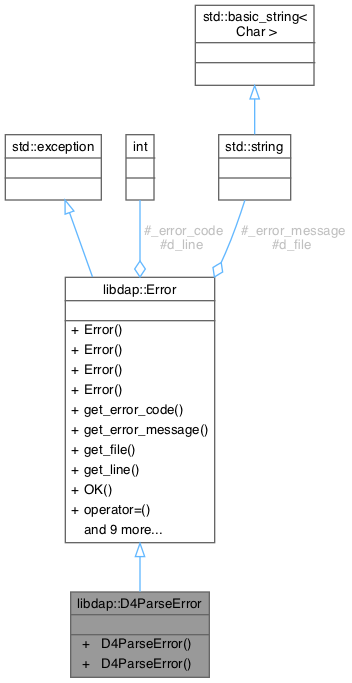#include <D4ParseError.h>
Thrown when the DMR document cannot be parsed.
Definition at line 34 of file D4ParseError.h.
◆ D4ParseError() [1/2]
| libdap::D4ParseError::D4ParseError |
( |
| ) |
|
|
inline |
◆ D4ParseError() [2/2]
| libdap::D4ParseError::D4ParseError |
( |
const string & | msg | ) |
|
|
inlineexplicit |
◆ get_error_code()
| ErrorCode libdap::Error::get_error_code |
( |
| ) |
const |
|
inherited |
◆ get_error_message()
| string libdap::Error::get_error_message |
( |
| ) |
const |
|
inherited |
Return the current error message.
Definition at line 212 of file Error.cc.
◆ get_file()
| std::string libdap::Error::get_file |
( |
| ) |
const |
|
inlineinherited |
◆ get_line()
| int libdap::Error::get_line |
( |
| ) |
const |
|
inlineinherited |
◆ OK()
| bool libdap::Error::OK |
( |
| ) |
const |
|
inherited |
Is the Error object valid?
Use this function to determine whether an Error object is valid. To be a valid, an Error object must either be: 1) empty or contain a message and a code.
- Returns
- TRUE if the object is valid, FALSE otherwise.
Definition at line 87 of file Error.cc.
◆ parse()
| bool libdap::Error::parse |
( |
FILE * | fp | ) |
|
|
inherited |
Parse an Error object.
Given an input stream (FILE *) fp, parse an Error object from stream. Values for fields of the Error object are parsed and this is set accordingly. This is how a client program receives an error object from a server.
- Parameters
-
| fp | A valid file pointer to an input stream. |
- Returns
- TRUE if no error was detected, FALSE otherwise.
Definition at line 106 of file Error.cc.
◆ print() [1/2]
| void libdap::Error::print |
( |
FILE * | out | ) |
const |
|
inherited |
Creates a printable representation of the Error object. It is suitable for framing, and also for printing and sending over a network.
The printed representation produced by this function can be parsed by the parse() member function. Thus parse and print form a symmetrical pair that can be used to send and receive an Error object over the network in a MIME document.
- Parameters
-
| out | A pointer to the output stream on which the Error object is to be rendered. |
Definition at line 144 of file Error.cc.
◆ print() [2/2]
| void libdap::Error::print |
( |
std::ostream & | out | ) |
const |
|
inherited |
Creates a printable representation of the Error object. It is suitable for framing, and also for printing and sending over a network.
The printed representation produced by this function can be parsed by the parse() member function. Thus parse and print form a symmetrical pair that can be used to send and receive an Error object over the network in a MIME document.
- Parameters
-
| strm | A reference to the output stream on which the Error object is to be rendered. |
Definition at line 171 of file Error.cc.
◆ set_error_code()
Set the ErrorCode. If the current error message has not been set, use ec to set the error message. The resulting error message string is the same as the ErrorCode name. If ec is not within the range of values for an OPeNDAP ErrorCode, the error message is left unchanged.
- Parameters
-
Definition at line 200 of file Error.cc.
◆ set_error_message()
| void libdap::Error::set_error_message |
( |
std::string | msg = "" | ) |
|
|
inherited |
Set the error message.
Definition at line 219 of file Error.cc.
◆ set_file()
| void libdap::Error::set_file |
( |
std::string | f | ) |
|
|
inlineinherited |
◆ set_line()
| void libdap::Error::set_line |
( |
int | l | ) |
|
|
inlineinherited |
◆ what()
| const char * libdap::Error::what |
( |
| ) |
const |
|
inlineoverridenoexceptinherited |
The pointer is valid only for the lifetime of the Error instance. jhrg 9/22/20.
Definition at line 152 of file Error.h.
◆ _error_code
◆ _error_message
| std::string libdap::Error::_error_message |
|
protectedinherited |
◆ d_file
| std::string libdap::Error::d_file |
|
protectedinherited |
◆ d_line
| int libdap::Error::d_line = 0 |
|
protectedinherited |
The documentation for this class was generated from the following file:

